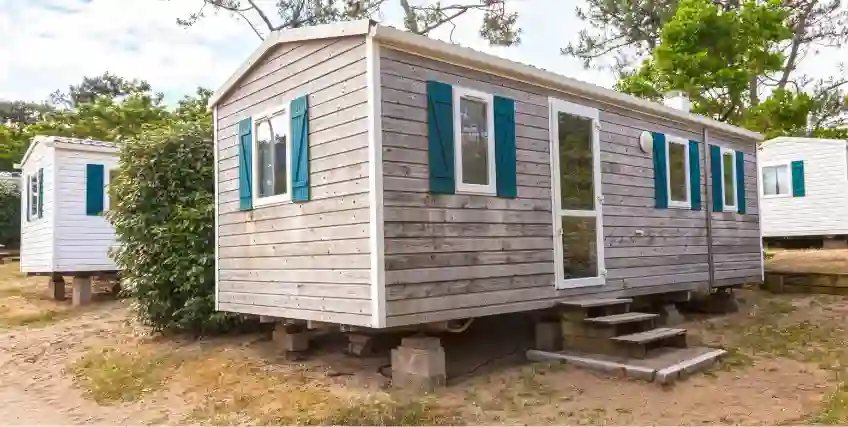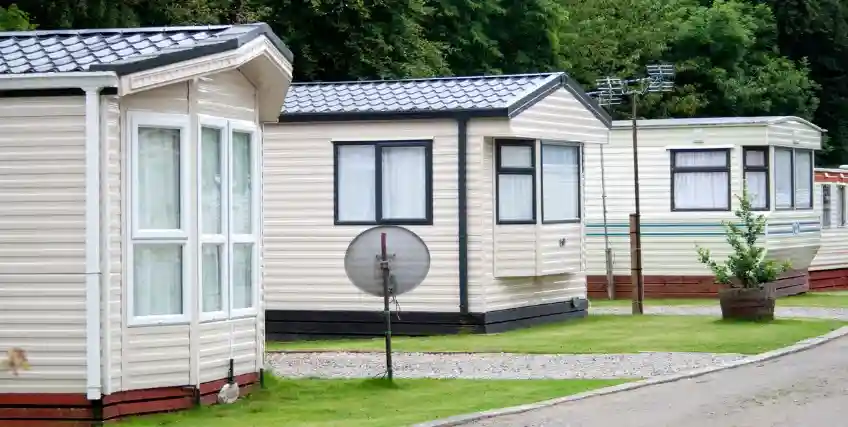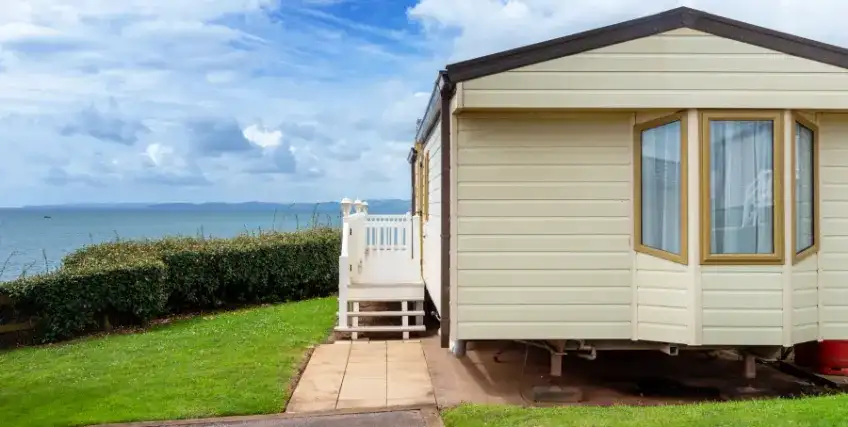Financing a Mobile Home Park: Options, Requirements, and Benefits for Investors
Sep 30, 2025 | Last Updated on: Oct 01, 2025

With housing costs rising, the demand for affordable housing in recent years has surged, and mobile home communities are uniquely positioned to meet that need for individuals and families alike. Mobile home parks are gaining traction as a highly attractive asset class for both new and seasoned real estate investors, offering steady cash flow and resilience even in a tough investment market.
That said, financing a mobile home park is often more complex than taking out a loan for a traditional multifamily or single-family property. Lenders have stricter borrowing requirements, the underwriting process is different, and specialized knowledge of this financing option is essential.
Read on to learn more about financing mobile home parks, the requirements you can expect from lenders, and some benefits and challenges that investors should consider. If you’re ready to move forward with financing a mobile home park, we’ll also talk about some strategies to increase your approval odds and lock in the most competitive rates possible.
Why Mobile Home Park Financing Is Unique
Unlike using a loan to buy typical residential or commercial properties, mobile home parks are considered a niche asset class. When it comes to loans, lenders treat them differently for several reasons:
- The mix of tenant-owned versus park-owned homes affects risk. Parks where residents own their units are seen as more stable, and they usually have lower turnover and maintenance costs.
- Infrastructure matters. Roads, utility systems, and compliance with local zoning rules all play a huge role in a mobile home park property valuation.
- Management expertise is critical. Lenders want to know that the borrower can not just build and rent out the property, but also handle the unique operational challenges of running a mobile home community.
Because of these factors, mobile home park lenders often have stricter underwriting guidelines than other types of real estate.
Options for Financing a Mobile Home Park
When it comes to mobile home park loans, investors have several options, each with their own unique terms and requirements. Choosing the right mobile home park lending option depends on the size of your mobile home park, your experience as a borrower, and any long-term investment goals you’ve identified.
Conventional bank loans
Many traditional banks offer financing for mobile home parks, though qualifying for these traditional loans can sometimes be difficult. Local banks and credit unions usually prefer to lend to parks with high occupancy rates (usually 80% or more), stable tenants, and a strong borrower credit history.
SBA loans
For smaller operators, SBA 7(a) or SBA 504 loans can provide flexible funding to finance a mobile home park. These loans, offered by various financial institutions but backed by the U.S. Small Business Administration (SBA), often come with longer repayment terms and lower down payments compared to conventional financing.
That said, borrowers may need to show a history of management experience and that the property meets strict eligibility standard in order to qualify for this type of financing. SBA loan options also have more involved requirements when it comes to providing a business plan, profit and loss statements (P&Ls), bank statements, and previous tax returns.
Commercial real estate loans
Many investors turn to specialized commercial lenders for financing a mobile home park. These loans can offer competitive mobile home park financing rates and may be structured as recourse or non-recourse.
- Recourse loans allow the lender to also go after both collateral and a borrower’s personal assets (like personal property and savings) if the loan goes into default.
- Non-recourse loans do not allow lenders to go after non-collateral, personal assets following a default.
Commercial real estate loans are well-suited for mid-to-large size locations with stable cash flow, and can be a good option for qualified borrowers looking to finance a mobile home park.
Private lenders and bridge loans
Private lenders are also an option when traditional financing for a mobile home park isn’t available. While interest rates are generally higher than other loan programs, private financing offers speed and flexibility. This makes it a useful and creative financing solution for acquisitions that need quick closings or for manufactured housing communities that don’t meet bank standards.
Seller financing
If you’re thinking about buying a mobile home park from the existing owner, having them finance the purchase may be an option, especially if they already own the property outright. With seller financing, the current owner acts like the lender; once you agree on the purchase price, interest rate, and other loan terms, you’ll make payments directly to the owner instead of a bank.
It’s important to have an ironclad agreement in place for this sort of arrangement, no matter the loan size. And if needed, you can always refinance into a more traditional business loan down the line.
Benefits of Mobile Home Park Financing
Despite the hurdles, there are significant advantages to securing mobile home park loans and buying this type of property.
One of the most attractive benefits is steady cash flow. As housing demand continues to grow, mobile home community occupancy typically remains high. This translates into reliable income for owners.
Along with that consistency comes long-term stability. Parks where residents own their homes (rather than rent them) often experience less turnover, meaning fewer expenses tied to marketing, repairs, and unit replacement.
Financing a mobile home park also makes scalability possible. Investors who might only be able to purchase a small property with cash can use loans to acquire larger parks or expand existing communities, compounding returns over time. And while the financing process is specialized, mobile home park financing rates can be competitive with those found in other areas of commercial real estate, making these investments more accessible than many first assume.
Investor Challenges When Financing a Mobile Home Park
While the opportunities are appealing, investors considering financing a mobile home park need to be aware of some key challenges.
For instance, zoning restrictions are one of the biggest barriers. Some municipalities resist new developments or expansions of mobile home communities, limiting growth potential for business owners.
Another issue is tenant mix. Parks with a high concentration of park-owned homes tend to be riskier from a lender’s perspective because the owner is responsible for upkeep, repairs, and the costs associated with tenant turnover. Parks primarily comprised of tenants who own their single- and double-wides are considered lower risk.
Regulatory compliance also poses challenges. Utility systems, safety codes, and infrastructure requirements must be carefully managed, and any deficiencies can become costly obstacles in both operations and financing.
Finally, the process of financing a mobile home park can be more complex than with conventional multifamily housing. Navigating the requirements of mobile home park lenders often calls for specialized knowledge and persistence, making the path to funding more complicated than it might first appear.
Final Thoughts
The demand for affordable housing has never been greater, and mobile home parks provide a resilient, cash-flowing solution for investors looking to diversify their portfolios. While financing a mobile home park comes with unique challenges, the right preparation and lender selection can unlock long-term financial stability. By understanding the financing landscape, meeting lender requirements, and presenting a strong case as a borrower, investors can position themselves for success in this growing sector.
FAQs About Financing a Mobile Home Park
What are the most common types of mobile home park loans?
Conventional bank loans, SBA loans, commercial real estate loans, agency-backed financing, and private lenders all provide options for mobile home park investors.
Do mobile home park loans cover manufactured homes, too?
Mobile home park loans generally cover the property and utilities on-site, though some lenders also offer loans for mobile homes in parks. Mobile home park loans can be used to purchase owner-managed homes on the property, if the land and existing homes are a package deal.
Do I need prior experience to get approved for mobile home park financing?
Experience helps significantly when financing or refinancing a mobile home park. Lenders prefer borrowers who have managed similar properties, but strong financials, a large down payment, and a clear management plan can sometimes offset a lack of experience.
Why do lenders prefer tenant-owned homes over park-owned homes?
Tenant-owned manufactured homes reduce a mobile home park’s operational responsibilities and maintenance costs, compared to a park where the investor also owns the homes. Tenant-owned homes make the investment less risky from a lender’s perspective.
Can I refinance an existing mobile home park loan?
Mobile home park loans can often be refinanced with the same or other lenders. Many investors refinance a mobile home park loan to secure better terms, lower mobile home park financing rates, or tap into equity for improvements and expansion.
Do I need a down payment when financing a mobile home park?
Down payments are often required when financing a mobile home park. The required down payment typically ranges depending on the type of loan you choose and the strength of your borrower profile.
Frequent searches leading to this page
Related Articles
Term Loans are made by Itria Ventures LLC or Cross River Bank, Member FDIC. This is not a deposit product. California residents: Itria Ventures LLC is licensed by the Department of Financial Protection and Innovation. Loans are made or arranged pursuant to California Financing Law License # 60DBO-35839




